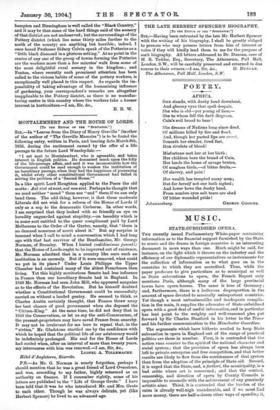MONTALEMBERT AND THE HOUSE OF LORDS.
[To THE EDITOR OP THE "SPECTATOR."] Si,—fn "Leaves from the Diary of Henry Greville " (brother of the author of "The Greville Memoirs ") is to be found the following entry, written in Paris, and bearing date March 9th, 1856, during the excitement caused by the offer of a life peerage to the future Lord Wensleydale :—
"I sat next to Montalembert, who is agreeable, and takes interest in English politics. He descanted much upon the folly of the life-peerage affair, and said it was inconceivable how the Government could be mad enough to weaken the institution of an hereditary peerage, when they had the happiness of possessing it, whilst every other constitutional Government had failed in solving the problem of a 'Second House."
In a like spirit Lord Houghton applied to the Peers the old motto : Aut sint ut aunt, aut non sint. Perhaps he thought that we need neither " mend " them nor "end" them if we can only bend them. The odd thing, however, is that these moderate
Liberals did not wish for a reform of the House of Lords if only as a sop to the democratic Cerberus. In other words, I am surprised that they looked with so friendly an eye on heredity unguarded against stupidity,—on heredity which is in some sort entitled to the queer compliment paid by Lord Melbourne to the Order of the Garter, namely, that "there is no damned nonsense of merit about it." But my surprise is lessened when I call to mind a conversation which I had long
ago with that last survivor of the Benthamites, Mr. George Norman, of Bromley. When I hinted (ealidissimus juventd) that the House of Lords ought to be improved out of existence, Mr. Norman admitted that in a country like ours such an institution is an anomaly. But if it were removed, what could we put in its place P Under Louis Philippe the Upper Chamber had contained many of the ablest Frenchmen then living. Yet this highly meritorious Senate had less influence in France than our hereditary Senate had in England. In 1848 Mr. Norman had seen John Mill, who appeared sanguine as to the effects of the Revolution. But he himself doubted whether a Constitutional Government could be successfully carried on without a landed gentry. He seemed to think, as Charles Austin certainly thought, that France threw away
her best chance of good government when she deposed the "Citizen-King." At the same time, he did not deny that in 1848 the Conservatism, or let us say the anti-Communism, of the peasant-proprietors may have saved France from anarchy.
It may not be irrelevant for me here to repeat that, in the "sixties," Mr. Gladstone startled me by the confidence with which he hoped that the political life of our aristocracy would be indefinitely prolonged. His zeal for the House of Lords had cooled when, after an interval of more than twenty years, my intercourse with him was renewed.—I am, Sir, lc., Hegel d'Angleterre, Biarritz.
LIONEL A. TOLLEMACHE.
P.S.—As Mr. G. Norman is nearly forgotten, perhaps I should mention that he was a great friend of Lord Overstone, and was, according to my father, highly esteemed as an authority on finance. If I remember rightly, some of his letters are published in the "Life of George Grote." I have been told that it was he who introduced Mr. and Mrs. Grote to each other. Though he was always delicate, yet (like Herbert Spencer) he lived to an advanced age.






















































 Previous page
Previous page